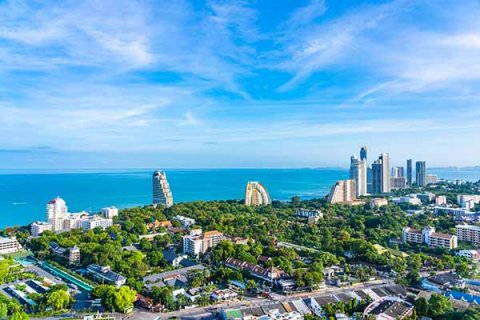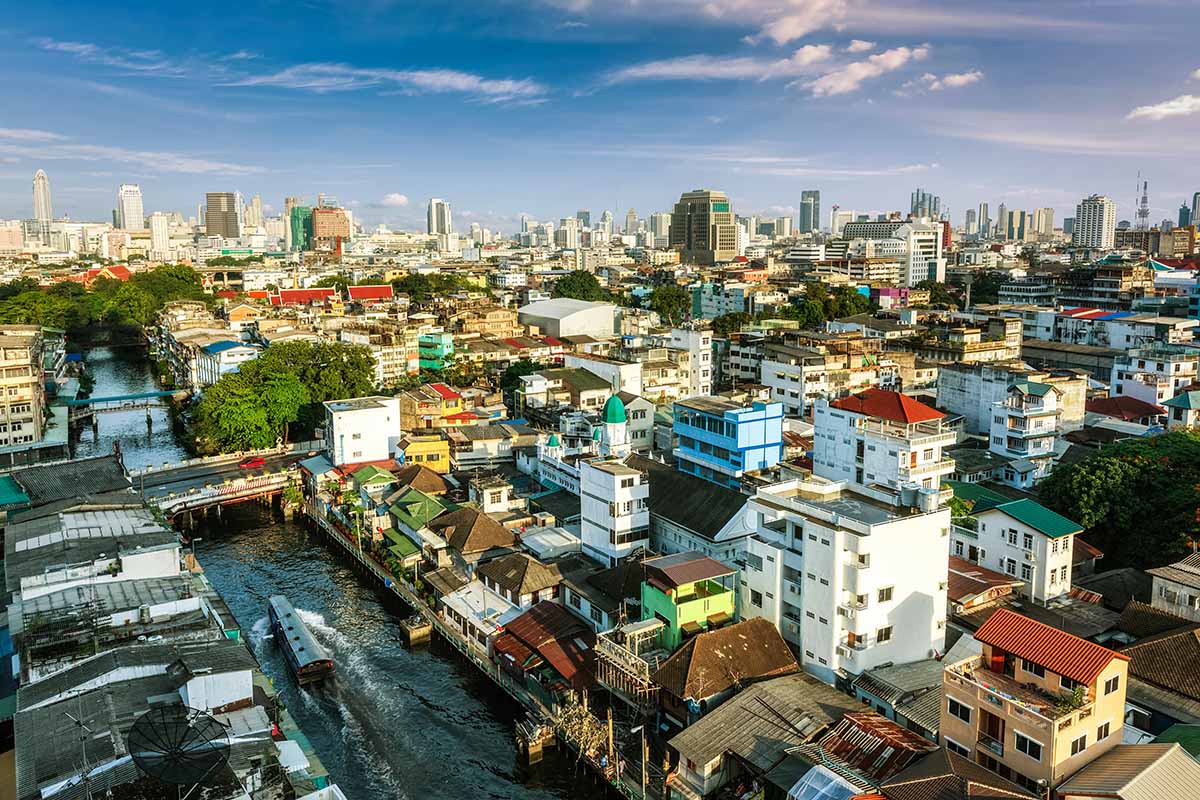
Thailand is one of the most affordable and attractive places for a comfortable holiday in 2024. This includes using the programme «Phuket Sandbox» where, after a 7-day stay in Phuket, vaccinated tourists can travel around the Kingdom freely. You no longer need to take PCR tests to enter the country because the No Quarantine policy has been simplified. This has provided an opportunity for those foreigners who wanted to purchase real estate in Thailand but were not able to do so before the quarantine.
In our article, we go into great detail about how real estate transactions work in Thailand, what rights and responsibilities are given to foreign homebuyers and whether it is simple for foreign citizens to purchase apartments in Thailand or any other type of property.
Content:
- Features of buying Thai housing
- How does buying real estate in Thailand work for foreigners?
- Forms of Ownership in Thailand
- Real estate and residence permits in Thailand
- Responsibilities of foreign homeowners in Thailand
- Step-by-step purchase of real estate in Thailand
- No. 1 Property selection and reservation
- No. 2 Legal aspects
- No. 3 Sales contract
- No. 4 Money transfer
- No. 5 Property title
- How does the registration procedure work?
- We will help you purchase real estate in Thailand

Features of buying Thai housing
The popularity of the Kingdom of Thailand is not limited to the tourism sector but is also popular with real estate investors. Houses in Thailand are acquired for personal use, permanent or seasonal residence and as investments for a rental income. Real estate in Thailand has become more attractive after the decline in prices caused by the pandemic and the Kingdom's guaranteed income programmes.
If you are planning to relocate, you should check out the rental options before buying a property in Thailand. Houses, apartments and condominiums are available all over the country. There are many modern condominiums with all the amenities such as swimming pools, fitness rooms and recreation centres.
Monthly rent for all types of buildings, from villas to high-rise buildings, is often considerably lower than in major European cities. Even in the most popular Thai regions and cities, the average rent costs less than half that of similar housing in the USA or Paris. Fees and amenities are either included in the rental price or not – you should consult the lessor beforehand.
How does buying real estate in Thailand work for foreigners?
A non-resident may acquire ownership of any kind of real estate in Thailand, adjusted for limitations on the registration of property rights. The land underneath a villa or detached home is registered as a long-term lease as foreigners are not permitted to own land in the Kingdom.
Forms of Ownership in Thailand
The two main property ownership forms in Thailand are also common globally:
Freehold – If a property is purchased in a freehold zone, it becomes the buyer’s property. This type of housing can serve as a passive source of income and can be inherited or given. As proof of ownership, the buyer receives an official document called a chanote.
A leasehold is a long-term lease with the option to renew it twice. The contract is for 30 years and can be extended up to 90 years. Although the actual ownership of the property is time-bound, it can be donated, inherited or sold. The contract is registered and certified by the Thailand Land Department.
What types of housing are available to purchase in Thailand?
In freehold zones, a non-resident can purchase an apartment in a condominium – a residential complex, the common area of which jointly belongs to the owners of the apartments.
An important condition: a condominium developer can sell only 49% of the housing to a foreigner. The remaining share is registered in the leasehold.
Detached houses, villas, and townhouses can be bought both in a leasehold and a freehold, but the surrounding area is only available in a leasehold.
Exception: A non-resident can purchase a land plot only if a legal entity makes a transaction, 51% of which must belong to a citizen of the Kingdom of Thailand.
Real estate and residence permits in Thailand
It is not possible to issue a residence permit in Thailand based on purchasing a property. However, there is an opportunity to get a long-term visa under the Thailand Elite program for investments for $17,500 (THB 605,000). Thai developers often meet buyers halfway and offer to apply for a visa when buying a housing unit.
.jpg)
Responsibilities of foreign homeowners in Thailand
A non-resident with property must properly pay utility bills and taxes. When purchasing real estate, one must also pay a one-time registration fee at the Land Department – typically equal to 2-3% of the property’s value.
Tax residents of other countries (living in their home country for more than 183 days in a year) also have tax liabilities in their state, i.e., they are obliged to notify the tax authority that they have opened an account in Thailand or for other financial transactions.
Step-by-step purchase of real estate in Thailand
To better understand the process of buying Thai housing, we suggest you become acquainted with its key aspects.
No. 1 Property selection and reservation
An important stage of the sale transaction is the reservation of the housing unit and the signing of a contract with the seller. The document provides detailed information about the transaction’s parties and important housing data, as well as the details of both parties and the payment schedule.
The buyer pays the seller a deposit of 1% of the cost and the housing unit is then withdrawn from the market.
Important! If the buyer terminates the transaction, the deposit remains with the homeowner but if the homeowner terminates it, the money will be refunded to the buyer.
What do you need for the reservation?
- A copy of the buyer's passport
- Email address
- Phone number
- Postal address
No. 2 Legal aspects
To observe the legal purity of the transaction, it’s necessary to check the condition of the housing. A lawyer can help in this matter and ensure compliance with mandatory legal norms.
What services do lawyers offer?
- Checking the land plot: Are there debt bonds, who is the real owner?
- Checking the seller's company;
- Checking the contract's correctness, making changes and agreeing with the current owner;
- Registering a transaction with the Land Department.
These aspects are relevant for the secondary market. In the market of new buildings in Thailand, the contract must just be verified and modified.
No. 3 Sales contract
After the deposit has been made, the seller provides the buyer with a sales contract for verification and possible adjustments. This document provides all information about the acquired property, the terms of purchase and the registration method. It also contains the financial costs of the documents and housing maintenance, as well as a fine if the terms and conditions are violated.
The contract includes copies of documents from both the transaction parties, including the documents for the housing unit.
No. 4 Money transfer
There are two main ways to pay for a transaction in Thailand:
- In the primary market – transfer funds to the details of the developer specified in the contract. Payment may be made anywhere in the world as long as the account is in the buyer's name, You can open a bank account in Thailand if you have a sales contract, passport, developer check and a deposit of USD 30 (THB 1,037). Payment may be made from the founder of a legal entity's account ;
- In the secondary market – opening an account in one of the banks of Thailand and transferring money to it from an account in your native or any other country. Once the housing has been registered with the Land Department, the buyer gives the seller a cheque for the amount.
Important: When buying freehold real estate, the money must be transferred from a foreign account. If you are buying a leasehold house, you can pay for the transaction in any convenient way.
If the condominium is not intended to be sold to a foreigner, the buyer can create a Thai company to purchase the property. Many people have created a company with nominal Thai shareholders. You not only own the majority of the shares but also the trustees for all nominal votes. For approximately USD 1,500 (TBH 50,000), you can create a company and all the documents you need. The company, of which you are a director, purchases and owns the property.
The downside is that you have to pay about TBH 15,000 a year to file corporate taxes and support your company. The good news is that it will be simple to sell or transfer the nominee business or the condominium directly to another foreigner. Consequently, the previous owner saves money on taxes associated with the ownership transfer. In other words, a person purchases a business with the condo as their only asset.
No. 5 Property title
Real estate transactions in Thailand are subject to mandatory registration with the Land Department. Usually, foreign buyers visit the department accompanied by Thai representatives as the local staff do not speak English well and all property documents are issued in Thai.
How does the registration procedure work?
If the housing is purchased on the primary market, the developer's representative, with a power of attorney from the foreign buyer, registers the transaction.
Legal assistance is provided on the secondary market.
When the transaction is made in the Land Department, the buyer receives a package of documents that may differ from the property registration method. Take the example of an apartment in a freehold zone:
- The standard Thai sales contract with the owner’s details, all the real estate information and the stamps and signatures of the authorized officials;
- Chanote (a document containing the property's layout and the owners' names);
- A house book with information about the unit.

We will help you purchase real estate in Thailand
Find your dream apartment in Thailand.Estate. Discover the best apartments, houses, villas and other types of housing, as well as reliable real estate agencies in Thailand.
